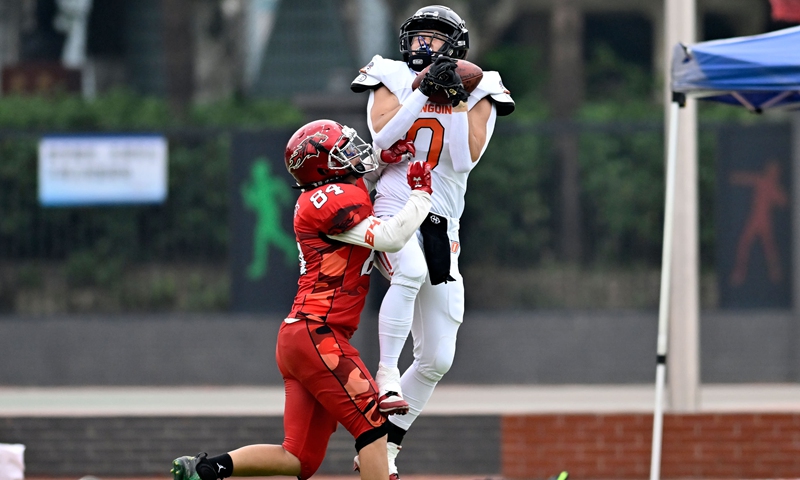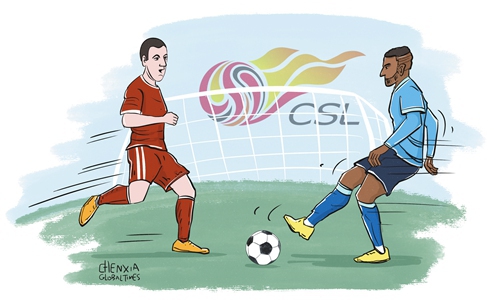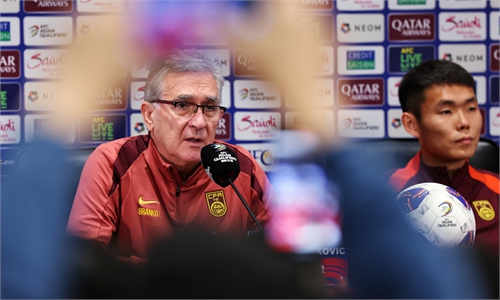ARTS / CULTURE & LEISURE
A team of American football in Chongqing keeps the dream alive a decade later
From the ground up

The Chongqing Dockers American football team plays against Chengdu's Mustangs football team on May 17 in Chengdu, Southwest China's Sichuan Province. Photo: Courtesy of Chengdu's Mustangs football team
Twelve years have passed, yet Liu Yuanfeng still dreams of that night - a night when a grassroots team, the Dockers, formed less than two years earlier and composed mostly of social players from Southwest China's Chongqing, unexpectedly rose to claim the championship at the inaugural AFLC (Amateur Football League of China) national final.Now, their story has been immortalized in the 2025 feature film Clash, which was just released on May 17.
Noting the film was his favorite one he's ever acted in, Matt William Knowles, who took on the role of the antagonist in the film, told the Global Times that he saw the "limitless athletic spirit" in the grassroots rugby team. "No matter who you are or what new skills you want to learn, anything is possible as long as you never choose to give up," Knowles noted.
Grit and growth
Wen Xue, known as the "rock" of the team, remembers those formative years with a mixture of pride and nostalgia. "We started with about 30 people in 2012. Every Saturday at 1 pm, we would gather at the training ground at Chongqing Medical University. It wasn't a dedicated field, it was rough and unpaved. We didn't even have exclusive use of the space. But we came every week, motivated by pure love for the game."
At the time, American football was still in its infancy in China, with only a handful of teams nationwide. "There were no official competitions yet. Most matches we played were arranged informally between teams, just for fun and experience," Wen told the Global Times.
"The sport was new and unfamiliar to most, but we embraced it with enthusiasm that went beyond winning or losing."
The team's fortunes shifted with the arrival of Chris, a former University of Michigan football player, who volunteered as head coach. "Chris brought professional tactics and a serious mindset," Wen said.
"He would talk to us individually, eat with us, encourage us. He kept the team together even when attendance dropped because training became more intense."
Chris's expertise helped turn the Dockers from a casual group of enthusiasts into a competitive team. Yet, even then, no one imagined they could become national amateur champions. "Though there were only eight teams when the first season's AFLC was announced, including Beijing, Shanghai, and Chengdu, and the overall level is undeveloped, we were still the underdogs."
Against all odds, the Dockers triumphed. Their unexpected victory at the first AFLC national final sent shockwaves through China's fledgling American football community. The victory was covered in local newspapers, which also drew attention of the foreign media. The win inspired a new wave of players to join the sport in Chongqing and beyond.

Members of the Chongqing Dockers football team Photo: Courtesy of Chengdu's Mustangs football team
Legacy and challenges
However, behind the triumph, there was never a "Titanic" story, and the cruise must go on.
Liu Yuanfeng, who captained the team, now works as a teacher and coaches youth football in Chongqing. "I still remember watching the film Clash and thinking how accurately it captured our reality - the poor gear, the coal slag field where a fall meant serious skin damage," Liu said. "But it also showed the spirit that never left us: the refusal to back down despite the challenges."
Liu's own passion for the sport was seeded in high school when he first encountered flag football and watched the inspirational movie Rudy.
"That movie planted a dream in me," he told the Global Times. "At college, I bought my own football and started researching the sport. We even formed a team on group chats, initially naming ourselves 'Rudy.' Later, as more people joined, we renamed ourselves to something more serious - the Dockers, representing the hard-working spirit of Chongqing's dock workers."
The Dockers' growth has mirrored the rapid development of American football in China. From fewer than 10 teams nationwide a decade ago, there are now more than 100 teams, with players increasingly coming from universities, companies, and other social circles. "Back then, we had to import helmets from the US and wait months. Now, equipment is much easier to access. Young people are more open to the sport," Wen said.
However, the sport's physical risks remain. Chris left the team in 2014, and as the team members grew older, injuries occurred and many of them left. Wen recalled that even recently, a coach suffered injuries during training, sparking concerns among families. "American football is a tough and sometimes intense sport," he said. "That's why flag football's inclusion in the 2028 Los Angeles Olympics is good news - it's less physical and easier for newcomers."
Recruitment is also a challenge Dockers have to face recently. In 2022, many veteran players rejoined, but after a disappointing season, most stepped back again.
Now the team is rebuilding, relying heavily on word-of-mouth introductions through friends and fitness trainers. "We don't use social media much for recruiting," Wen said. "Most new players come through recommendations."
Despite the turnover, the Dockers' core spirit remains intact.
"Every summer in Chongqing, it's 30 to 40 degrees Celsius, and we still train from 1 pm to 5 pm on Saturdays," Liu said. "A foreign coach once told me that in the US, even high-school teams don't always have many players traveling to away games. But if everyone is united, nothing is impossible. I didn't get that back then, but I do now."
Liu also emphasized the importance of legacy. "The first group of kids we coached have grown up and are now teaching the next generation. Whether or not we win trophies, the spirit is passed down. That's what matters."
As the Dockers prepare for another challenging season coming soon, Liu remains optimistic. "Our goal is to give our all in every game, with no regrets. I tell new players every match could be their last - play like it's everything. Balancing work, studies, and football is tough, but this sport is precious. We will keep going."



